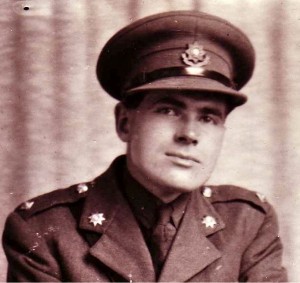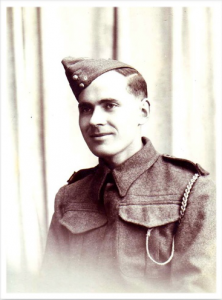
Over recent years the immense contributions made by Dan Billany to the city of Hull have become better known, especially after the publication of a biography by local authors Valerie Reeves and Valerie Showan in 1999. Subsequent research has shown that Billany was indeed a ‘lost hero’, but in a number of different ways. Billany’s place in getting himself to University after leaving school at 14 by studying at the ‘Tec’ in the evening was an achievement in itself. As a tireless socialist campaigner, a war hero and a literary giant, there were enough heroes for several lives. But perhaps Dan’s greatest battle, it has emerged, was with his own sexuality, which in an age of cruel repression and lack of understanding took him until his mid twenties even to admit to himself. Eventually he fell hopelessly in love, unrequited as far as we know, with David Dowie, a fellow inmate of a couple of the Italian POW Camps in which he was interned from 1942-3. He then died, together with his beloved David, trying to reach the allied lines before the occupying Germans seized them. Their bodies have never been found, and Dan Billany – who had spent his early life fighting Fascism on the streets of Hull – was to end his time fighting it on the mountains of Italy. To us he was a hero. Here is his story.
He was born a hundred years ago in a small terraced house in Devon Street, off Hull’s famous Hessle Road, into a large working class family of strong socialist convictions. His great grandfather had stood as a Radical candidate in the 1885 election for Hull Central. Dan was to inherit those socialist convictions. Throughout his brief life, he always fought on the side of the underdog against the oppressors. Before fighting Fascism in Hull and then North Africa and Italy, he was to fight his way to University, get a degree, and qualify as a teacher.
But perhaps his biggest fight of all was to be with himself, over the growing realization of his homosexuality in a society where it was illegal and treated as a perversion. Dan left school at the age of 14 having hated the authoritarian, mind-0numbing education that was imposed there. He started his working life as an errand boy, delivering goods from a high class grocer to better off households. This reinforced his view of the inequality in society, and he was soon on his soapbox on street corners preaching socialism and the cause of the underprivileged. He was later to write that he would die of shame if ever he stopped feeling angry at the injustices of society and try to do something about them. He became for a while an apprentice electrician, but that was not for him either. He faced a period of unemployment, had his benefits stopped (because his sister was working), joined the National Unemployed Workers Movement and was part of a massive protest against the Means Test at Hull’s Corporation Fields in 1932, which hit he headlines in the Hull Daily Mail.
Then he decided to ‘get himself an education’ for which he needed money and family support. He attended free classes for the unemployed at the City’s Technical College in Park Street, later enrolling in day and evening classes so that he could obtain his matriculation (the equivalent of A levels). By 1934, against massive odds, Dan had qualified to study for a BA in English Literature at what was then the University College of Hull. During all this time Dan had continued his socialist activities and begun to write. At the University, he became for a while Secretary of the Socialist Group which was the forerunner of the later Socialist and Labour Clubs. He graduated in 1937 and then spent a further year qualifying to become a teacher.
Dan got a job at Chiltern Street School where he was much influenced by the educational ideas of A. S. Neil, revolutionary for the time, about child-based learning. Dan’s teaching methods were notably informal and did not always endear him to his headmaster. It seems that it was about this time that Dan began to realize his homosexuality, even if he was not yet capable of accepting it. The taboos against it and his own lack of understanding of it, together with his desire not to alienate himself from his family, all militated against it. Even so, in one of his short stories he wrote that “it was a sort of love which, in the world as we know it, could not be made public. One might say rather ‘commit suicide’; some have done.” Or ,as another writer put it , “the love which dare not speak its name.” Dan also published a highly successful childrens’ and detective novel.
In the autumn of 1940, Dan volunteered to join the Army to help defeat the Fascism which he had always hated. After his basic training, he joined the East Yorkshire Regiment in 1941 and was soon shipped to North Africa via the long route round the Cape of Good Hope and across the Egyptian Desert. Unfortunately, this was the time of a successful German counter-offensive, and in June 1942 Dan was captured by the Germans, although for a while he was officially listed as missing – much to the concern of his family back home.

He was shipped across the Mediterranean and held in a series of Italian POW Camps. In September 1942 he was sent to camp 17 where he was to meet the love of his life, fellow author David Dowie, eight years younger than himself. At first Dan tried to deny to himself that he was physically attracted to David. Indeed he even suggested to his sister back home that David would make her an ideal husband. This was despite the fact that both she and David were already engaged to be married (but not to each other!). The friendship between David and Dan grew deeper. They worked together on “The Cage” , a thinly disguised account of their life in a POW camp which was later to be praised as one of the finest pieces of literature to come out of the war. Dan realized that he had fallen head-over-heels in love with David, and eventually plucked up his courage and declared his love.
David was shocked and broke off his friendship with Dan. Dan was devastated for now he did not even have his beloved David’s friendship. Dan wrote in his Diary that he supposed that when he returned to England he would “have to get married”. He said that he had no desire to be a “spinster” nor upset his beloved family. In this respect, Dan was a true child of his age. “Gay marriage’’ then meant gay men getting married in desperation to “escape” their true nature. Some genuinely believed that this would convert them to heterosexuality. Others merely wanted to quieten wagging tongues. This version of ‘gay conversion’ was every bit as cruel and unsuccessful as today’s quack therapy, or “praying the gay away.” In this Dan was just like so many thousands of gay men of his time, forced to deny their true nature and chance of finding happiness. That was simply the reality of the day, and men such as Dan were heroes for somehow managing to live with it.
Dan and David were then moved to Camp 49 at Fontanellato. In July 1943 there were ecstatic celebrations in the camp as news seeped through of the fall of the Italian Fascist Dictator, Benito Mussolini. Dan in particular was exultant that after 20 years, the new Fascist World Order that Mussolini had predicted had collapsed. A month or so later the Italians sued for peace, and Dan and the other prisoners were set free. Danger, however, was not gone. The Germans moved in to the North of the country and Dan and David, together with a couple of others, tried to reach the advancing allied armies tortuously approaching from the south. Along the way they were sheltered by Italian peasant families. The last heard of them was on 23rdNovember 1943, when in a freezing winter they set off again over the mountains. No-one knows for certain what became of them. There has been much speculation. The version I would like to believe is that the bodies of two English soldiers,found frozen to death, huddled together in a last desperate effort to keep warm, or perhaps in a last act of love, were those of Dan and his beloved David.

Had Dan lived a few months longer he might have been one of the allied soldiers in Italy ignorantly dubbed by the Tory MP, Lady Astor, ‘D Day Dodgers’. The last verse of the song about that could equally have applied to them. They too missed D-Day because they were dead:
“Look around the mountains,
In the mud and rain,
You’ll see the scattered crosses
There are some which have no name
Heartbreak and toil and suffering gone,
The boys beneath them slumber on
They are the D Day Dodgers
Who will stay in Italy”
Had Dan returned to England it would have been another quarter-of-a-century before the passing of the Homosexual Law Reform Act started the long, still incomplete search for equality and dignity. In other words, he would have been faced with exactly the same problems as before. Dan is a hero to us because he fought against ALL injustice and prejudice, but within his short life he never lived to see a world more understanding of his true nature. Had he done so I believe that he would, in his writings, been as great a champion of Gay Rights as he had been of other oppressed groups. Because of the harsh times that he lived in, however, he ended up fighting for everybody but himself. In different circumstances, we believe he would have promoted gay rights with the same inspirational fervour. But like so many of his, and later, generations, it took him a while to come to terms with the injustice that society was imposing on him simply because of his sexuality. Like thousands of others of his generation known and unknown he was a true hero just by living day by day
in a hostile world.
Following a feature by Danny Norton on his local Loud and Proud programme on West Hull FM, there have been renewed demwnds for a revial of ‘Hero’ a play about the last months of Dan’s life by local writer Barrie Wheatley
We think this would be a fitting tribute to Dan especially were it to be mounted for LGBT History Month ,in February 2017 when Hul will be celebrating its status as city of culture. Dan is still a largely forgotten local hero—and not just to the LGBT Community and we hope the organisers take notice of this.
By Colin Livett.
